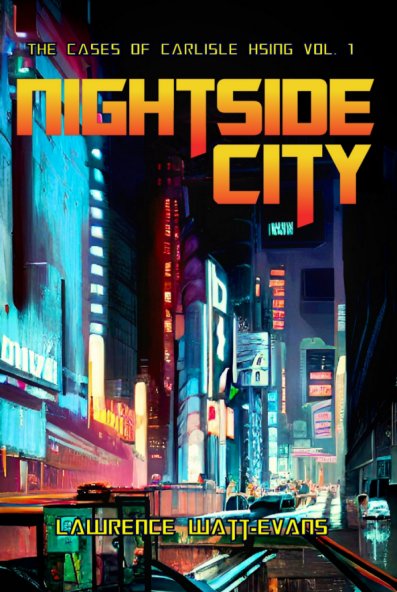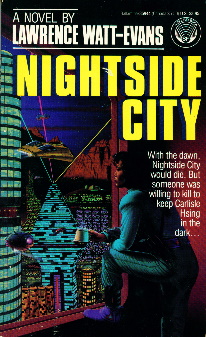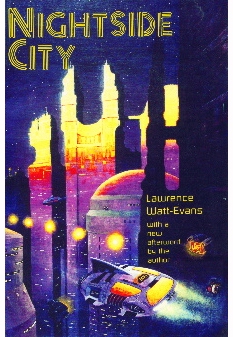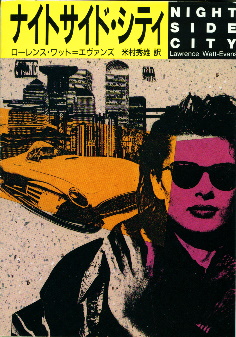

Nightside City is my personal favorite of all my science fiction novels to date. It was originally published by Del Rey Books in 1989 (ISBN 0-345-35944-5), then reprinted by FoxAcre press, and is now available from Misenchanted Press, with cover art by Luca Oleastri.
Over there to the left you'll find a list of links that can take you to the various parts of this page, telling you all about the novel.

Nightside City was the entertainment capital of the planet Epimetheus, but it was doomed -- the planet's rotation was bringing it out into the lethal sunlight.
So why was someone buying up real estate? Evicted squatters hire down-on-her-luck private eye Carlisle Hsing to find out...
Nightside City
by Lawrence Watt-Evans
Chapter One
The city outside my window was a cacophoty of neon and stardust, a maze of blinding glitter and flash, and from where I sat it was all meaningless, no discrete images at all -- nothing discrete, and certainly no discretion. I knew that the casino ads were shimmying and singing like sirens, luring passersby onto the rocks of the roulette wheels and randomizers, sucking them in with erotic promises of riches, but all that reached me through the window was a tangle of colored light and a distant hum, punctuated every so often by the buzz and blink of a macroscopic floater passing nearby. Even the big ships landing or lifting didn't bother me -- the window was angled so I couldn't see them unless they buzzed the Trap, which would have gotten any pilot's license erased, and the port's big damper fields kept the noise out of the city.
As long as I kept the window transparent I always had the flicker and the sparkle and the hum for a background, and the blaze of light and color was there if I bothered to look, but I didn't have the noise and flash grinding in on me.
I liked it that way. There was a time when I had an office in the Trap, as we called it -- the Tourist Trap -- but that was a long time ago. When the case I'm telling you about came up I had my little place in the burbs, on Juarez Street, and I could see the lights of Trap Over all the more clearly for the added distance. Instead of the overwhelming come-ons, the holos and the shifting sculptures of stardust, all I saw was just light and noise.
And was it ever really anything more?
Of course, I won't lie to you -- I wasn't out in the burbs by choice, not really. When I was young and stupid and new at my work I fell for a sob story while I was on a casino job, and I let a welsher take an extra day. He was off-planet within an hour, and IRC had to shell out the bucks to put an unscheduled, shielded call through to Prometheus and nail him there. They weren't happy with me, and when Interstellar Resorts Corporation isn't happy with you, you don't work in the Trap. Even their competitors don't argue with that.
I'm just glad the bastard didn't have enough cash to buy his way out-system; if IRC had had to chase him to Sol or Fomalhaut or somewhere I'd be lucky to live a week.
Of course, if he'd had out-system fare he would have paid his tab in the first place. It wasn't that big, which was another reason I'm still up and running.
When you can't work in the Trap, though, there isn't that much detective work left on Epimetheus, short of security work in the mines. I wasn't ready to fry my genes out there in some corner of nightside hell, making sure some poor jerk who didn't know any better didn't pocket a few kilocredits' worth of hot ore. Mine work might have had more of a future than anything in the City, but it's not the sort of future I'd care to look forward to.
And I didn't know anything but detective work, and besides, I wasn't going to give IRC the satisfaction of driving me out of business.
That left the burbs, from the Trap to the crater's rim, so that's where I went. It's all still part of the City, really -- everything inside the crater wall is Nightside City, and anything outside in the wind, or off Epimetheus, isn't, which keeps it simple. So I was still in the City, and I figured I could pick up the crumbs, the jobs that the Trap detectives didn't want, and get by on that.
Sometimes it worked, sometimes it didn't. I worked cheap and I made sure everyone knew that. I got my office out in Westside, where you could almost see the sun peeping over the eastern rim, where the land was cheap because it would be the first to fry as the dawn broke. I was only on Juarez, though; I wasn't all the way out in the West End. I stayed as close in as I thought I could afford, to buy myself time. Eastside, in the crater wall's shadow, would be safe for about three years after the West End went -- not that I'd care to stay there once the port, over to the south of the Trap, goes -- and that meant it was more expensive. I might have found more work out that way, I don't know, but there were too many people out east who knew what IRC thought of me.
In Westside they generally knew, but they could none of them afford to care.
One thing about moving out of the Trap -- I moved right out of my social life, too. My friends at the casinos somehow never found the time to call me any more. I didn't meet any tourists out on Juarez, either. The people I did meet -- well, some of them weren't bad, but they weren't exactly high society.
Besides, I had to work so hard to survive I didn't have time to hang out in the streets. Most of my business dealings were with clients or with software, and socializing with clients is always a mistake.
I don't see anything wrong with socializing with software, as far as it goes, but it tends to be pretty limited. You don't meet much software that takes the same approach to things like sex, credit, food, or family that humans do. Software doesn't have family in the human sense.
Of course, I didn't have very much family. All the family I had left in the City was my brother, and he worked in the Trap; he called sometimes, stayed in touch, but he didn't make it a point to drop by, if you know what I mean. His employers might not have been pleased if he had.
We hadn't been all that close anyway. We weren't any closer with me out on Juarez.
I had my office, and I did any work that came my way. I tracked down missing husbands, missing wives, missing children, missing pets -- biological, cybernetic, or whatever. I went after missing data, and of course, missing money. Anything anyone mislaid I went after, and more often than not I found whatever it was.
I got a break once when I followed up a string of complaints about a crooked operator at the Starshine Palace and nailed a guy so dumb that he was skimming from both the customers and the house, but who had a really slick way of doing it; catching him was good work, and it got me a lot of good publicity. It also made me an enemy, as the casino had Big Jim Mishima on the case, and I beat him to it, and the casino kept Jim's fee as a result. Big Jim resented that, and I can't blame him, but I couldn't see my way clear to screw up; I had a reputation and damn little else, and I keep what I have. At least, I do when I can.
The Palace almost considered talking to me again after that, since I'd saved them some juice, but then IRC reminded them of the gruesome details of my past and they decided I still wasn't welcome.
But I was less unwelcome at the Palace than in any of the other casinos -- like a leftover program wasting memory, but one they might need someday, not pure gritware.
I did a few other jobs here and there, whatever I could get. I ate dinner most days, usually lunch, too, and I never got more than two months behind on my rent or my com bill. Every so often I even splurged on a drink or a sandwich at Lui's Tavern, two blocks over on Y'barra, and watched Lui's holoscreen instead of my own.
Of course, in a year or so I was going to either have to go to the mines, move east, or get off-planet if I didn't want terminal sunburn, and it didn't look as if I'd have enough saved up to get off Epimetheus. Moving east didn't have much appeal -- it just put off the inevitable. I was beginning to contemplate the inevitability of a career in heavy metals.
My situation was not exactly an endless scroll of delights, and my prospects were a good bit less rosy than the sky I saw behind the Trap. That sky looked a little brighter every day, even when Eta Cass B was out of sight somewhere below the horizon. Which it wasn't, just then, when this case first came up. It was out of sight of my window, but I knew that Eta Cass B was high in the west, and I could see its glow reddening the dark buildings just across the street, while its big brother reddened the eastern horizon and washed half the stars out of the sky above with a blue that looked paler every day.
The sky used to be black, of course, and was still black and spattered with stars in the west, but the first hint of dark blue was starting to creep up from the eastern rim even before I left the Trap, and there were fewer stars to be seen every time I bothered to look.
Every time another star vanished, so did another chunk of the city's population; anyone who could afford to leave did, and those who couldn't afford it were saving up. That was cutting into what little business I had -- I didn't have a single case going, and hadn't for two days. I was sick of watching the vids, and with no income I couldn't afford to go out, not even to Lui's.
So I sat there, watching the glitter and sparkle of the city try to drown out that insidious coming dawn, and I wasn't any too happy about my life. Getting out of the Trap was probably good for my soul -- I suppose my ancestors would know for sure, but I can only guess -- but it wasn't any good for my mood or my credit line. The distance and the window fields kept the city's noise down to a murmur, but I could still hear it, and I was listening to it so hard just then that at first I thought the beep was coming from outside.
Then the com double-beeped and I knew it wasn't outside. I hit the pad on the desk -- the place had had pressure switches when I moved in, and I couldn't afford to convert to voice, so I roughed it. I guess an earlier tenant liked his fingers better than his tongue -- or maybe he was some kind of antiquarian fetishist. It wasn't even a codefield, but an actual keypad. Before I took that office I'd never seen one anywhere else except history vids, let alone used one, but I got the hang of it after awhile. It gave the place a certain charm, an air of eccentricity that I almost liked. It was also a real pain in the ass to use, no matter how much practice I got, but I couldn't afford to do anything about it.
So I roughed it, and when the com double-beeped I hit the ACCEPT key. My background music dimmed away and someone asked, "Carlisle Hsing?"
The voice was young and male and nobody I knew. I could hear the wind muttering behind him, so I knew he was outside, probably on my doorstep from the sound of it. I didn't bother to check the desk's main screen yet.
"Yeah," I said, "I'm Hsing."
"I...uh, we want to hire you."
That sounded promising. I flicked on the screen.
The Story Behind the Story:
In the mid-1980s the hot thing in science fiction was cyberpunk, as exemplified by William Gibson's Neuromancer. I read that book, and some interviews with Gibson, and concluded that all the stuff about cyberspace and neural interfaces and other tech was just trappings -- what Gibson was really doing was writing noir science fiction, combining the atmosphere of hardboiled detective fiction with a jazzy near-future setting. Gibson himself cited Raymond Chandler as a major influence.
I liked cyberpunk -- well, some of it, anyway. I thought the whole "hot tech" approach was a good thing. It gave SF back some excitement. Science fiction in the '60s and '70s and early '80s didn't seem to have anywhere near the headlong thrills of the best stuff from the '40s, but cyberpunk did.
So I decided to write me a cyberpunk novel -- or at least, a noirish SF novel.
I wasn't a huge Raymond Chandler fan, unlike Gibson; my tastes in the noir line ran more to Ross MacDonald. The idea of creating a futuristic Lew Archer appealed to me. Except that big white guys as protagonists have been the default for so long that they're boring; I decided I wanted my detective to be a small woman. (I seem to have been using logic akin to what Joss Whedon did in creating Buffy Summers, actually.) And I decided a mixed-race ancestry would be interesting, and at that point I realized her name was Carlisle Hsing, she's mixed British and Chinese, four foot eleven...
I didn't actually plan all that; after a certain point Hsing just happened, without conscious input.
And then I got thinking about Lew Archer's Los Angeles. The real Los Angeles isn't exactly noir -- it's actually a pretty bright, sunny place, without a lot of the claustrophobic, shadowed settings of film noir. MacDonald and Chandler got around that by using metaphorical shadows -- corruption and guilty secrets and the like -- and by setting a lot of the story at night. But I thought that given the SF side of what I wanted to do, I could make the dark night of the soul more literal, and use a setting where it's always night. (The movie Dark City did the same thing ten years later, even more literally and explicitly.) A spaceship or orbital station was too confined, but the dark side of a tidelocked planet -- that was perfect!
Whereupon it occurred to me that I could give it a very satisfactory feeling of impending doom if it wasn't going to stay on the nightside, if the sun was going to rise and burn away everything that made the city what it was...
That was when I contacted planetologist Sheridan Simon, who had been advertising in Locus that he would design worlds for SF writers, and we began to seriously create Epimetheus and Nightside City. Which was an immense amount of fun. Dr. Simon was a delight to work with.
So I had my hero and my setting, and the rest grew organically out of that. The research and planning and planetary design took me years; actually writing the novel only took a few weeks, and was ridiculously easy and just as much fun as designing Epimetheus.
The Sequel:
When Nightside City was first published, I had high hopes for it. I thought it was pretty darn good. It got good reviews. So I started writing a sequel, and even came up with a springboard for a third volume.
Then the early sales figures came in, and I stopped. I'd written a little over 10,000 words, along with an outline and notes, of what was intended to be an 80,000-word novel.
That's where it remained for close to twenty years -- Realms of Light consisted of four and a half chapters and a lot of notes, and The End of the Night, the third Carlisle Hsing story, was a single page of notes.
However, starting in 2005, I began writing online serials of works that readers want and publishers don't. The first two were Ethshar novels, but I decided they didn't all have to be; Realms of Light was a candidate for serialization.
And in 2008, I serialized it. It was not a great success, so although I did complete Realms of Light, I don't know whether I'll ever continue the series I call the Cases of Carlisle Hsing, nor to set any more stories on Epimetheus.
If I do write more, that old one-page precis for The End of the Night has now expanded into a rough plot for two novels, The Ruins of Mars and The End of the Night; I've written the opening paragraph of The Ruins of Mars, but that may be as far as it goes.
Factoids, In-Jokes, & Trivia:
- "Hsing" is the Wade-Giles spelling of the Chinese word for "star" -- a bit of an in-joke there. Wade-Giles has been replaced by Pinyin, which implies that Carlisle Hsing's direct-male-line ancestors had left China and adopted a westernized spelling before the end of the 20th century.
- Yes, the names of the two thugs, Paulie Orchid and Bobo Rigmus, are puns -- "polyorchid" and "borborygmus." (If you don't know the words, look 'em up.)
- "Cacophoty" in the first sentence is not a typo nor any other sort of mistake; it's a deliberate coinage. "Cacophony" means an auditory mess; "cacophoty" means a visual mess.
Publishing history:
North America:- First U.S. edition: Del Rey Books, April 1989
- Second U.S. edition: FoxAcre Press, May 2001
- First ebook edition: FoxAcre Press, November 2010
- Third U.S. edition: Misenchanted Press, February 2023
- Second ebook edition: Misenchanted Press, February 2023
- Hayakawa SF #1030, 1993, ISBN 4-15-011030-1; translated by Hideo Yonemura
Previous Covers:
 |  |  |
|---|---|---|
| Del Rey cover | FoxAcre Press cover | Japanese cover |
| Art by David Schleinkofer | Art by Martina Pilcerova |
Click here to return to the top of the page 

